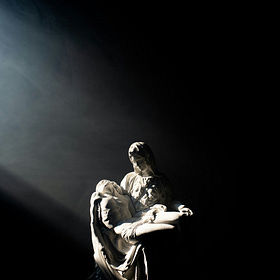Introduction to Asian American Gifts to the Church
This week we welcome Dr. Russell Jeung to the blog for the first of a six-part series on Asian America. Russell Jeung is Professor of Asian American Studies at San Francisco State University and co-Founder of Stop AAPI Hate. In 2021, he was named one of the TIME 100 most influential people in the world. Find the full series at the bottom of this article.
“The nations will walk by its light, and the kings of the earth will bring their splendor into it.” -- Revelations 21:24
What splendor will Asian American Christians bring to the City of God? What gifts will we present at the Great Banquet? We certainly can’t show up empty-handed; that would be rude…
This series explores the God-given splendor of the Asian American church that we can offer to the rest of the body. My hope for these posts is that not only will Asian Americans experience gratefulness and perhaps healing of our group identities, but also that we might collectively and intentionally help light up the Kingdom for others.
Asian American Christians may not see themselves as a distinct community with racial and cultural traits, but I believe that God has indeed given us specific gifts as a group. Let me start by explaining why identifying our collective blessings is relevant and so necessary.
First and foremost, as actress Sandra Oh observed, “It’s an honor just to be Asian.” Although we may sometimes feel shamed for being different or embarrassed over families that seem dysfunctional (in the Western sense), God does honor us as Asian Americans.
I actually spend a lot of time and energy over dealing with my shame. When I say something harsh and stupid, I rue over being harsh and stupid and how others may perceive me as such. Such toxic shame, where I internalize sins as defining who I am, and where I become overly focused on how I am seen, can be debilitating.
On the other hand, I rarely consider how I’m honored and favored. My parents have adored me as their youngest child, giving me piggy-back rides and Chinese treats. Jesus himself, the Son of God, deems me his friend, with whom he wants to spend time and share life.If I can receive such favor and experience that Asian way of loving, perhaps I can more fully see myself as an Asian American in the image of God.
Further, God has historically used nations and communities to carry out his ministries, and I believe our ethnic heritages and particular social locations equip us to build up the Body. African Americans provide unique perspectives on the theology of liberation, and Latinos offer insights on the theology of borderlands. Each theology helps us understand major themes in Scriptures and how God loves us as His people, as members of groups.
Likewise, Asian Americans, I have written, are developing a theology of exile. A self-understanding as exiles and resident aliens to this world is a predominant identity for Jews and Christians, and Asian Americans have much to say regarding this subject matter. As we read throughout the Bible how exiles find belonging and meaning, Asian Americans may resonate with these specific situations experienced as groups. In so doing, we might find hope and redemption for ourselves in our own journeys of immigration, generational transitions, and multiculturalism.
And certainly, others see us as a distinct group. As a co-founder of Stop AAPI Hate, I’ve reviewed the 10,000 incidents of racism that Asian Americans and Pacific Islanders have faced during the first year and a half during the COVID-19 pandemic. We’re vilified as disease-carriers and spat upon, stereotyped as perpetual foreigners to the US and told to go back home.
Even these racialized experiences, where we’re mistreated as outcasts and strangers, can be used for God’s purposes.
That’s because when we’re weak, God’s grace is sufficient and his power is made perfect. So I will boast all the more gladly about being Asian American when we’re ascribed lowly status, so that God’s power can rest and work through me.
These giftings are not necessarily unique to Asian Americans nor are these characterizations meant to essentialize or lump together Asian Americans. Yet we have good reasons to receive the gifts which God has showered upon Asian Americans. I look forward to re-gifting what I’ve received.
Dr. Russell Jeung is a sociologist and professor in the Asian-American Studies Department at San Francisco State University. He received a B.A. in Human Biology and a M.A. in Education from Stanford University. After working in China and in the Mayor's Office of San Francisco, he obtained his Ph.D. in Sociology from the University of California, Berkeley in 2000. In 2020, Dr. Jeung launched Stop AAPI Hate, a project of Chinese for Affirmative Action, the Asian Pacific Policy and Planning Council, and SF State Asian American Studies. It tracks Covid-19 related discrimination in order to develop community resources and policy interventions to fight racism.
Asian American Gifts to the Church Series
Introduction to Asian American Gifts to the Church
Asian American Christians may not see themselves as a distinct community with racial and cultural traits, but I believe that God has indeed given us specific gifts as a group. Let me start by explaining why identifying our collective blessings is relevant and so necessary.
The Gift of Hesed
This love was unconditional. She cared for him devotedly even when he couldn’t respond with affirmation because he couldn’t speak. He couldn’t offer physical touch since he couldn’t move. The time spent together must have been lonely and sad; it wasn’t the “quality time” of which Chapman wrote.
The Gifts of Blessing
When the prodigal son returns, the father erases the shame by restoring the blessing that their relationship confers. He authorizes his servants to dress him with a robe, just as Joseph had received from Jacob, symbolizing the father’s favor. The son receives a ring indicating he has the father’s power and authority over household affairs. And he is shod with sandals that reflect his family status within the home, as compared to the servants who remained bare-footed. (This point defies the general Asian American experience, as no self-respecting Asian would wear shoes in the house).
The Gift of Dim Sum
My family took Saturday excursions to Chinatown to shop, to join youth groups, to work at my father’s office, and mostly, to eat. Although I would occasionally go off on my own to get a cheeseburger, my father especially loved having the entire family go out for yum cha (drink tea) in order to enjoy dim sum (lightly touching your heart) dishes such as chive dumplings or steamed spare ribs with black bean. He lived to eat.
The Gift of Presence
From this model of family togetherness, I’ve come to know how showing up for church family is one of the ultimate reasons of God’s will and for my own being. Jesus came as Emmanuel, God with us, to restore our very purpose as God’s creation and to repair our communion with God. Jesus showed up to make a new people, reflecting the unity of the Trinity. Being present—together with others—constitutes our very essence as God’s family of God.
The Gift of Sacrifice
Having experienced sacrifice as a love language, I think we Asian Americans can understand God’s sacrifices for us in ways that others may not so readily grasp. With these parental models of sacrifice, we recognize that we can never repay or reciprocate what we have received. Instead, in order to convey our love in return, we earnestly work to make them proud and to be able to take care of them when we can.











